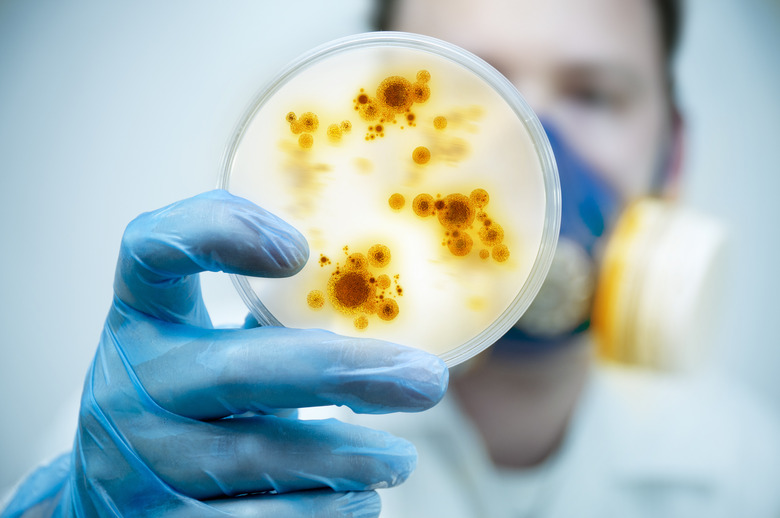Definitions Of Control, Constant, Independent And Dependent Variables In A Science Experiment
The point of an experiment is to help define the cause and effect relationships between components of a natural process or reaction. The factors that can change value during an experiment or between experiments, such as water temperature, are called scientific variables, while those that stay the same, such as acceleration due to gravity at a certain location, are called constants.
The scientific method includes three main types of variables: constants, independent, and dependent variables. In a science experiment, each of these variables define a different measured or constrained aspect of the system.
Constant Variables
Constant Variables
Experimental constants are values that should not change either during or between experiments. Many natural forces and properties, such as the speed of light and the atomic weight of gold, are experimental constants. In some cases, a property can be considered constant for the purposes of an experiment even though it technically could change under certain circumstances. The boiling point of water changes with altitude and acceleration due to gravity decreases with distance from the earth, but for experiments in one location these can also be considered constants.
Sometimes also called a controlled variable. A constant is a variable that could change, but that the experimenter intentionally keeps constant in order to more clearly isolate the relationship between the independent variable and the dependent variable.
TL;DR (Too Long; Didn't Read)
If extraneous variables are not properly constrained, they are referred to as confounding variables, as they interfere with the interpretation of the results of the experiment.
Some examples of control variables might be found with an experiment examining the relationship between the amount of sunlight plants receive (independent variable) and subsequent plant growth (dependent variable). The experiment should control the amount of water the plants receive and when, what type of soil they are planted in, the type of plant, and as many other different variables as possible. This way, only the amount of light is being changed between trials, and the outcome of the experiment can be directly applied to understanding only this relationship.
Independent Variable
Independent Variable
The independent variable in an experiment is the variable whose value the scientist systematically changes in order to see what effect the changes have. A well-designed experiment has only one independent variable in order to maintain a fair test. If the experimenter were to change two or more variables, it would be harder to explain what caused the changes in the experimental results. For example, someone trying to find how quickly water boils could alter the volume of water or the heating temperature, but not both.
Dependent Variable
Dependent Variable
A dependent variable – sometimes called a responding variable – is what the experimenter observes to find the effect of systematically varying the independent variable. While an experiment may have multiple dependent variables, it is often wisest to focus the experiment on one dependent variable so that the relationship between it and the independent variable can be clearly isolated. For example, an experiment could examine how much sugar can dissolve in a set volume of water at various temperatures. The experimenter systematically alters temperature (independent variable) to see its effect on the quantity of dissolved sugar (dependent variable).
Control Groups
Control Groups
In some experiment designs, there might be one effect or manipulated variable that is being measured. Sometimes there might be one collection of measurements or subjects completely separated from this variable called the control group. These control groups are held as a standard to measure the results of a scientific experiment.
An example of such a situation might be a study regarding the effectiveness of a certain medication. There might be multiple experimental groups that receive the medication in varying doses and applications, and there would likely be a control group that does not receive the medication at all.
Representing Results
Representing Results
Identifying which variables are independent, dependent, and controlled helps to collect data, perform useful experiments, and accurately communicate results. When graphing or displaying data, it is crucial to represent data accurately and understandably. Typically, the independent variable goes on the x-axis, and the dependent variable goes on the y-axis.
Cite This Article
MLA
Twist, Benjamin. "Definitions Of Control, Constant, Independent And Dependent Variables In A Science Experiment" sciencing.com, https://www.sciencing.com/definitions-dependent-variables-science-experiment-8623758/. 12 August 2023.
APA
Twist, Benjamin. (2023, August 12). Definitions Of Control, Constant, Independent And Dependent Variables In A Science Experiment. sciencing.com. Retrieved from https://www.sciencing.com/definitions-dependent-variables-science-experiment-8623758/
Chicago
Twist, Benjamin. Definitions Of Control, Constant, Independent And Dependent Variables In A Science Experiment last modified August 12, 2023. https://www.sciencing.com/definitions-dependent-variables-science-experiment-8623758/
